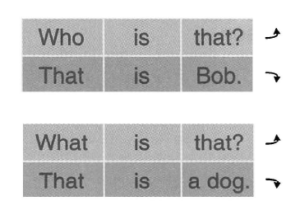Phrasing
You're familiar with how phrasing imparts crucial information. Employing a rising tone at a sentence's conclusion indicates a question, while a falling tone signifies a statement.
Asking Questions
Pay close attention to the audio and observe the distinction in sound between a statement and a question. Take note of the arrows.

Place a check mark next to the accurate response for each question. Subsequently, verify your choices using the Answer Key.
1. Who is that?
10. Who are those people?
Replacing Subject Nouns with Pronouns - Pronunciation
Replacing Object Nouns with Pronouns - Pronunciation
Replacing Nouns with Pronouns - Pronunciation
Replacing the Nouns - Pronunciation




